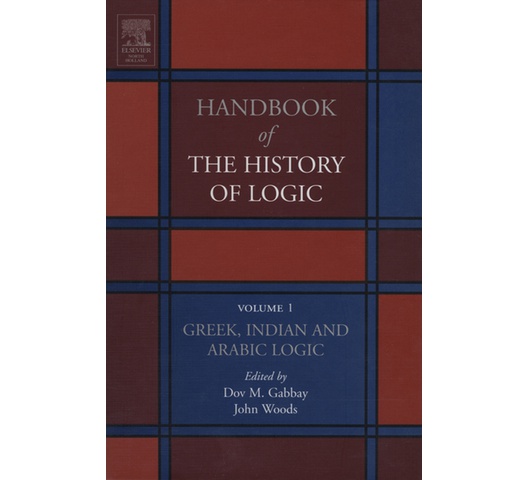
Greek, Indian and Arabic Logic
by Gabbay, Dov M., Woods, John
This is an eBook that you can download electronically.
Greek, Indian and Arabic Logic marks the initial appearance of the multi-volume Handbook of the History of Logic. Additional volumes will be published when ready, rather than in strict chronological order. Soon to appear are The Rise of Modern Logic: From Leibniz to Frege. Also in preparation are Logic From Russell to Gödel, Logic and the Modalities in the Twentieth Century, and The Many-Valued and Non-Monotonic Turn in Logic. Further volumes will follow, including Mediaeval and Renaissance Logic and Logic: A History of its Central.
In designing the Handbook of the History of Logic, the Editors have taken the view that the history of logic holds more than an antiquarian interest, and that a knowledge of logic's rich and sophisticated development is, in various respects, relevant to the research programmes of the present day. Ancient logic is no exception. The present volume attests to the distant origins of some of modern logic's most important features, such as can be found in the claim by the authors of the chapter on Aristotle's early logic that, from its infancy, the theory of the syllogism is an example of an intuitionistic, non-monotonic, relevantly paraconsistent logic. Similarly, in addition to its comparative earliness, what is striking about the best of the Megarian and Stoic traditions is their sophistication and originality.
Logic is an indispensably important pivot of the Western intellectual tradition. But, as the chapters on Indian and Arabic logic make clear, logic's parentage extends more widely than any direct line from the Greek city states. It is hardly surprising, therefore, that for centuries logic has been an unfetteredly international enterprise, whose research programmes reach to every corner of the learned world.
Like its companion volumes, Greek, Indian and Arabic Logic is the result of a design that gives to its distinguished authors as much space as would be needed to produce highly authoritative chapters, rich in detail and interpretative reach. The aim of the Editors is to have placed before the relevant intellectual communities a research tool of indispensable value.
Together with the other volumes, Greek, Indian and Arabic Logic, will be essential reading for everyone with a curiosity about logic's long development, especially researchers, graduate and senior undergraduate students in logic in all its forms, argumentation theory, AI and computer science, cognitive psychology and neuroscience, linguistics, forensics, philosophy and the history of philosophy, and the history of ideas.
SKU: 9780080532868
Format: PDF
In designing the Handbook of the History of Logic, the Editors have taken the view that the history of logic holds more than an antiquarian interest, and that a knowledge of logic's rich and sophisticated development is, in various respects, relevant to the research programmes of the present day. Ancient logic is no exception. The present volume attests to the distant origins of some of modern logic's most important features, such as can be found in the claim by the authors of the chapter on Aristotle's early logic that, from its infancy, the theory of the syllogism is an example of an intuitionistic, non-monotonic, relevantly paraconsistent logic. Similarly, in addition to its comparative earliness, what is striking about the best of the Megarian and Stoic traditions is their sophistication and originality.
Logic is an indispensably important pivot of the Western intellectual tradition. But, as the chapters on Indian and Arabic logic make clear, logic's parentage extends more widely than any direct line from the Greek city states. It is hardly surprising, therefore, that for centuries logic has been an unfetteredly international enterprise, whose research programmes reach to every corner of the learned world.
Like its companion volumes, Greek, Indian and Arabic Logic is the result of a design that gives to its distinguished authors as much space as would be needed to produce highly authoritative chapters, rich in detail and interpretative reach. The aim of the Editors is to have placed before the relevant intellectual communities a research tool of indispensable value.
Together with the other volumes, Greek, Indian and Arabic Logic, will be essential reading for everyone with a curiosity about logic's long development, especially researchers, graduate and senior undergraduate students in logic in all its forms, argumentation theory, AI and computer science, cognitive psychology and neuroscience, linguistics, forensics, philosophy and the history of philosophy, and the history of ideas.
KES 43,238

International delivery
Free click & collect
When you buy an ebook from TBC, you will be given a code to download your
purchase from our ebook partner Snapplify. After you have redeemed the code and
associated it with a Snapplify account, you'll need to download the Snapplify Reader
to read your ebooks. The free Snapplify Reader app works across iOS, Android,
Chrome OS, Windows and macOS; on tablets and mobile devices, as well as on
desktop PCs and Apple Macs.
You're currently browsing Text Book Centre's digital books site. To browse our range of physical books as well as a wide selection of stationery, art supplies, electronics and more, visit our main site at textbookcentre.com!
Reviews
This product does not have any reviews yet.
Add your review
